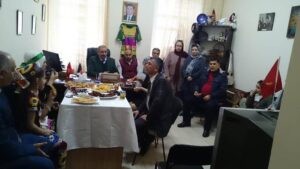KABUL (SW) – Coinciding with September 28, the International Day of Access to Information, a number of journalists and media officials, complaining about the limitation of access to information in government offices, say that the officials of some government institutions do not share information with them on time, and some other institutions also refuse to give information.
Syed Bilal Sayad, a reporter for Noor private TV station in Kabul, said that the lack of access to timely information from government institutions has made it difficult for him to work as a journalist. He added: “It’s very difficult for me as a reporter. Several entities do not share information in a timely manner. Only few items are shared in WhatsApp groups. I have not been able to publish the report many times and we have published the report several times without the principle of journalistic balance.”
Islamuddin Behnoosh, a reporter for Tamdan private TV in Kabul, also said: “One of the problems facing journalists in the current situation is the lack of access to information, especially timely access to information. Some government institutions cooperate less with the media and journalists.”
Shakiba (pseudonym), a reporter in one of the radio stations, said that the non-provision of information by some government institutions has become a serious challenge to her work. This reporter stated: “We are really having trouble getting information. Some government departments whose opinions we need, they are not willing to chat. Although we have contacted many times through calls or messages, but they still don’t share their opinion. Like the ministries of defense, interior and public health. This makes our daily work difficult.”
On the other hand, the officials of some media houses also say that lack of access to information and not sharing information on time by some government institutions has had a negative impact on the content produced and the work of the media.
Qasim Azizi, director of the news department at 1TV, said: “There is no doubt about this, when there is no source, the information is not timely, the work of a journalist becomes difficult. We are witnessing that it is difficult for us to access information at the same time, and in some cases, no information is made available to journalists by the government authorities.”
At the same time, the officials of the Afghanistan Independet Media Support Organization – NAI say that the cancellation of the Access to Information Law and the Monitoring Commission of Access to Information has limited access to information.
Nai official Zarif Karimi told Salam Watandar: “In the last two years, we have seen the imposition of restrictions on access to information in Afghanistan. This situation has caused the media and people to be in an information vacuum. The lack of information means that transparency and accountability are not ensured and any kind of challenge in the work of informing can originate from the situation of limiting access to information.”
However, Abdul Wahid Rayan, the head of publications of the Ministry of Information and Culture, says that government institutions are obliged to provide timely information to the media, and journalists can also share their complaints about this with the ministry.
He added: “We have also heard some complaints that some ministries are not cooperating. The Information Access Commission has now become a directorate, its head has just been appointed, he will start his work on Sunday, journalists can share their problems with this directorate.”
ENDS






